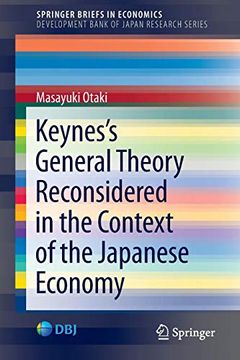Share
Keynes's General Theory Reconsidered in the Context of the Japanese Economy (Springerbriefs in Economics) (in English)
Masayuki Otaki (Author)
·
Springer
· Paperback
Keynes's General Theory Reconsidered in the Context of the Japanese Economy (Springerbriefs in Economics) (in English) - Masayuki Otaki
$ 52.09
$ 54.99
You save: $ 2.90
Choose the list to add your product or create one New List
✓ Product added successfully to the Wishlist.
Go to My WishlistsIt will be shipped from our warehouse between
Monday, July 15 and
Tuesday, July 16.
You will receive it anywhere in United States between 1 and 3 business days after shipment.
Synopsis "Keynes's General Theory Reconsidered in the Context of the Japanese Economy (Springerbriefs in Economics) (in English)"
This book reconsiders Keynes?s The General Theory of Employment, Interest and Money and establishes a new interpretation. In contrast to the existing models, this book finds that theThis book reconsiders Keynes?s The General Theory of Employment, Interest and Money and establishes a new interpretation. In contrast to the existing models, this book finds that the stickiness in the nominal wage is not crucial for his theory. Moreover, the author has also succeeds in capturing the concept of liquidity in a rigorous mathematical model. In conjunction with the development of the concept of liquidity, the separation of the decision between savings and capital investment, which plays a key role in the principle of effective demand and denies Say?s law, is exactly and originally formulated.The theory thus developed is applicable to elucidating some serious political economic causes that entrap the long-stagnated Japanese economy. For example, an analytical explanation is provided about why disinflation/deflation incessantly progresses despite the exorbitant expansionary monetary policy (ijigen kin-yuu seisaku) by the Bank of Japan. This phenomenon is an unsolvable question from the quantity-theoretic approaches (e.g., monetarism and new Keynesianism) which, although they differ in assumptions concerning the length of adjustment periods, commonly assume that the price level sooner or later rises in proportion to the quantity of money.Owing much to Keynes, the author?s approach considers that the price level is mainly governed by its marginal prime cost which is equal to the nominal wage as a first approximation. As such, the drastically sagging wages during the past 10 years provoke serious disinflation/deflation. It should be noted that this discussion never depends on the quantity of money.
- 0% (0)
- 0% (0)
- 0% (0)
- 0% (0)
- 0% (0)
All books in our catalog are Original.
The book is written in English.
The binding of this edition is Paperback.
✓ Producto agregado correctamente al carro, Ir a Pagar.

